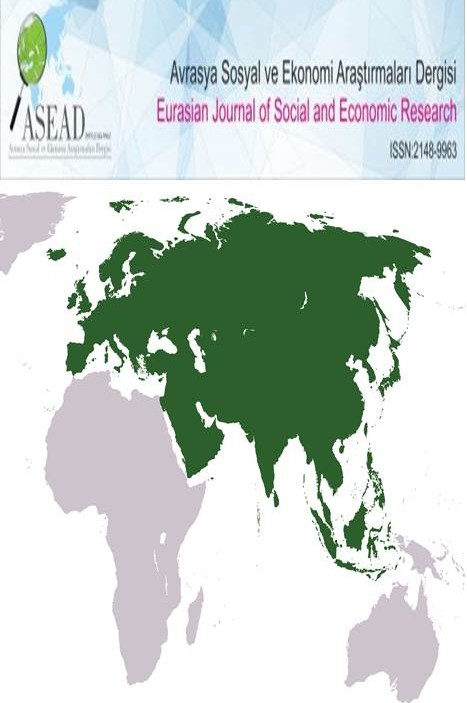YUMUŞAK GÜÇ KAPSAMINDA TEORİK BİR ANALİZ: SPOR DİPLOMASİSİ ÖRNEĞİ
Yumuşak Güç, Kamu Diplomasisi, Spor Diplomasisi
AS A UNIVERSAL INSTRUMENT OF SOFT POWER: AN EVALUATION ON SPORTS DIPLOMACY
Soft Power, Public Diplomacy, Sports Diplomacy,
___
- Best, Alexander R. & Austin, Ian (2022) International Sports Diplomacy in Action – An Investigation of AUS+RALLY: An Australian Sports Diplomacy Campaign in Japan, Japanese Studies, 42:2, 111-135.
- Brannagan, Paul Michael & Giulianotti, Richard (2015) Soft Power and Soft Disempowerment: Qatar, Global Sport and Football’s 2022 World Cup Finals, Leisure Studies, 34 (6), 703-719.
- Cull, Nicholas J. (2008). “Public Diplomacy: Taxonomies and Histories. The Annals of The American Academy of Political and Social Science, 616 (1), 31-54.
- Fanoulis, Evangelos & Revelas, Kyriakos (2023) The Conceptual Dimensions of EU Public Diplomacy, Journal of Contemporary European Studies, 31(1), 50-62.
- International Olympic Truce Centre (2023). The History of Olympic Truce. https://olympictruce.org/en/profile/history/ (Erişim Tarihi: 15.07.2023).
- Izadi, Foad (2016). US Public Diplomacy: A Theoretical Treatise, The Journal of Arts Management, Law, and Society, 46(1), 13-21.
- Kearn, David (2022). The Crisis of American Soft Power. Journal of Polıtıcal Power.15 (3), 397-414.
- Kuruloğlu, Fehim (2023). Sports Diplomacy and Propaganda in Turkish Foreign Policy in the Early Republican Period, The International Journal of the History of Sport, 40:2-3, 111-124.
- Marlin-Bennett, Renée (2022) Soft Power’s Dark Side, Journal of Political Power, 15(3), 437-455.
- Morgenthau, Hans J. (2006). Politics Among Nations The Struggle for Power and Peace, Mcgraw Hill Higher Education, New York.
- Murray, Stuart & Pigman, Geoffrey Allen (2014). Mapping The Relationship Between International Sport and Diplomacy, Sport in Society, 17(9), 1098-1118.
- Murray, Stuart (2012). The Two Halves of Sports-Diplomacy, Diplomacy & Statecraft, 23(3), 576-592.
- Murray, Stuart (2018). Sports Diplomacy: Origins, Theory and Practice. Routledge.
- Nye, Joseph S. (2004). Soft power: The Means to Success in World Politics. Public affairs.
- Nye, Joseph S. (2008). Public Diplomacy and Soft Power. The Annals of the American Academy of Political and Social Science, 616 (1), 94-109.
- Nye, Joseph S. (2021). Soft Power: The Evolution of a Concept. Journal of Political Power, 14 (1), 196-208.
- Nye, Joseph. S. (2004). Soft Power and American Foreign Policy. Political Science Quarterly, 119, 255–270.
- Proedrou, Filippos & Frangonikolopoulos, Christos (2012) Refocusing Public Diplomacy: The Need for Strategic Discursive Public Diplomacy, Diplomacy & Statecraft, 23 (4), 728-745.
- Rothman, Steven B. (2011) Revising The Soft Power Concept: What Are The Means and Mechanisms of Soft Power?. Journal of Political Power, 4 (1), 49-64.
- Sak, Elif (2014). Kamu Diplomasisi ve Çin. Barış Araştırmaları ve Çatışma Çözümleri Dergisi, 2 (1), 9-25.
- San-Eugenio, Jordi. Ginesta, Xavier & Xifra, Jordi (2017) Peace, Sports Diplomacy and Corporate Social Responsibility: A Case Study of Football Club Barcelona Peace Tour 2013. Soccer & Society, 18(7), 836-848.
- Scott-Smith, Giles (2016). Cultural Diplomacy, Global Diplomacy, Theories, Types, and Model, Alison Holmes and Simon Rofe (Ed.), 176-189.
- T.C. İletişim Başkanlığı (2022), Kmau Diplomasisi Nedir? https://www.iletisim.gov.tr/images/uploads/dosyalar/Kamu_Diplomasisi_Nedir.pdf (Erişim Tarihi: 10.07.2023).
- Trunkos, Judit (2022). Testing The Impact of Geopolitics on European Democratic Countries’ Soft Power Use, Journal of Political Power, 15 (3), 532-555.
- Tutak, Eda (2022). Deniz Gücünün Ulusal Güç İçindeki Yeri ve Küresel Rekabete Etkisi. “İktisadi ve İdari Bilimlerde Güncel Gelişme ve Trendler” İsimli Kitap İçinde Bölüm. Gazi Kitabevi, Ankara.
- Tutak, Eda (2023). Denizcilik Politikalarının Ağ Yönetimi Yaklaşımıyla Kamu Politikası Açısından Değerlendirilmesi: AB Örneği. UPA Strategic Affairs, 4 (1), 129-159.
- Tutak, Eda ve Koçer, Gökhan (2023). 21. Yüzyıl Deniz Gücünün Askeri ve Ticari Perspektiften Analizi İçin Yeni Bir Yaklaşım Önerisi: Türkiye Örneği. Akdeniz İİBF Dergisi, 23 (1), 1-17.
- Uğuz, Hülya ve Saygılı, Rukiye (2016). Küresel Dünyada Ulus Devlet. Sosyal Ekonomik Araştırmalar Dergisi, 16 (32), 127-147.
- Xu, Honggang, Wang, Ke & Mi Song, Young (2020) Chinese Outbound Tourism and Soft Power. Journal of Policy Research in Tourism, Leisure and Events. 12(1), 34-49.
- Yatağan, A. Görkem (2018). Sert Güç Unsurlarının Yumuşak Güç Aracı Olarak Etkileri. Kara Harp Okulu Bilim Dergisi. 28 (2), 69-94.
- Yayın Aralığı: Yılda 4 Sayı
- Başlangıç: 2014
- Yayıncı: İrfan TÜRKOĞLU
VERGİ KAÇAĞINI ÖNLEMEDE YENİ BİR ARAÇ OLARAK ADLİ MUHASEBE
İsmet Türker CEDİMAĞAR, Duygu CELAYİR
MARDİN YEŞİLLİ’DE (RİŞMİL) KONUŞULAN ARAPÇA LEHÇEDE İKİLEME TÜRLERİ VE ANLAMLARI
BEYİN GÖÇÜNÜN ÜLKE RİSK DERECELERİ BAKIMINDAN DEĞERLENDİRİLMESİ: SHRINKAGE YÖNTEM UYGULAMALARI
LİDER ÜYE ETKİLEŞİMİ VE PSİKOLOJİK GÜÇLENDİRME ARASINDAKİ İLİŞKİ: HİZMET SEKTÖRÜNDE BİR ARAŞTIRMA
Nadire ÇEREZCİ BAYCAN, Pınar KAZAZ
UMUDUN PSİKOLOJİK İYİ OLUŞA ETKİSİNDE İYİMSERLİĞİN ARACILIK ROLÜ
Betül OKUDUR SABUNCU, Dilek KOCABAŞ, Ahmet Yasin ŞENYURT
EKONOMİK İSTİSMAR ÖLÇEĞİ’NİN TÜRKÇE GEÇERLİK VE GÜVENİRLİK ÇALIŞMASI
Erdinç KALAYCI, Ayşe Sezen SERPEN, Hasan Fehmi ÖZDEMİR, Veli DUYAN
CARİ AÇIK – DIŞ BORÇ İLİŞKİSİNİN VAR ANALİZİ İLE İNCELENMESİ: TÜRKİYE ÖRNEĞİ
